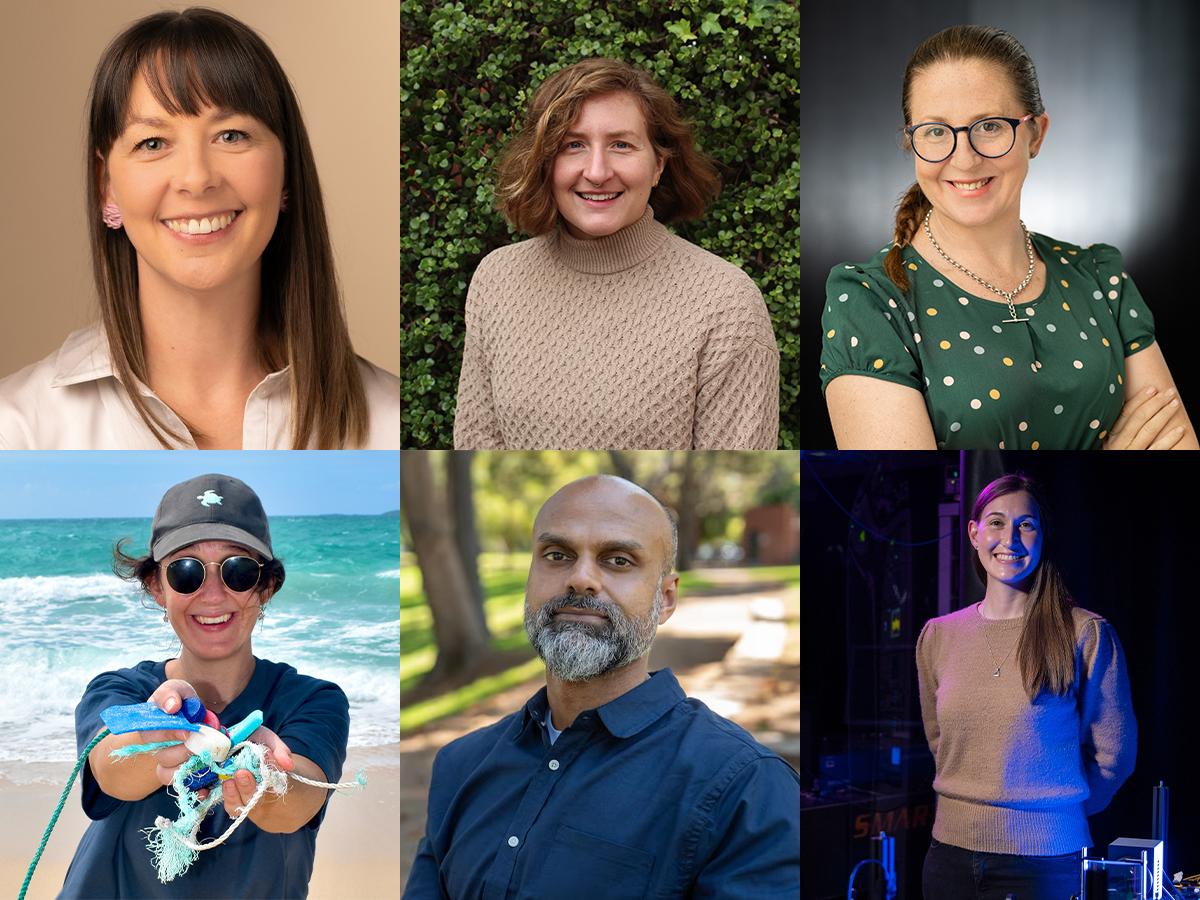Our Poppies the pick of the bunch
University of Adelaide marine ecologist Dr Nina Wootton has been named South Australia’s Young Tall Poppy of the Year.

Clockwise from top left: Dr Sarah Boyle (University of South Australia), Dr Georgina Falster (University of Adelaide), Dr Amy Hutchison (University of Adelaide), Dr Sarah Scholten (University of Adelaide), Dr Ben Singh (University of South Australia), Dr Nina Wootton (University of Adelaide).
A post-doctoral researcher at the School of Biological Sciences, Dr Wootton is passionate about science education and protecting our oceans from the devastating impacts of plastic pollution.
Her research has involved quantifying the amount of plastic and microplastic found in seafood species globally, analysing the potential effects of plastic on seafood species and fisheries, and working with the seafood industry to help develop solutions to this growing plastic problem.
“I am so excited to be named the SA Young Tall Poppy of the Year. It’s incredibly special to be recognised not only for my research, but also for my passion for sharing science with others. I look forward to continuing to work with schools, community groups, and the public to inspire curiosity and promote science,” she said.
Dr Wootton was chosen from a shortlist of Young Tall Poppy Science award winners, including five other researchers from the University of Adelaide and University of South Australia. Their expertise in chrono-nutrition, climate science, marine ecology and precision measurement garnering this prestigious recognition.
The Young Tall Poppy science awards are an initiative of the Australian Institute of Policy and Science (AIPS) and have been established to celebrate researchers who combine cutting-edge science with a passion for engaging and inspiring others.
The shortlist of Young Tall Poppies, including Dr Wootton, was announced at the beginning of August.
“I am thrilled to see such a strong showing from both the University of Adelaide and University of South Australia,” said Professor Anton Middelberg, Deputy Vice-Chancellor (Research) at the University of Adelaide and Deputy Vice Chancellor Research & Innovation at Adelaide University.
“These are six bright young minds who are leading their fields and improving so many aspects of our society through their work. It is exciting to have their combined talent included in the inaugural cohort for Adelaide University, which opens in 2026.”
Other University of Adelaide and University of South Australia researchers honoured in the South Australian 2025 Young Tall Poppy Science Awards include:
Dr Sarah Boyle is an ARC DECRA Research Fellow at UniSA’s Centre for Cancer Biology, leading the Cancer Matrix and Mechanics Group within the Tumour Microenvironment Laboratory. Her research investigates how cancer cells hijack non-cancerous cells in their vicinity, and how physical stress in the tumour’s ecosystem promotes metastasis and recurrence. By identifying the mechanisms involved, she is paving the way for new treatments and improved patient outcomes.
Dr Georgina Falster is a DECRA Fellow from the University of Adelaide’s School of Physics, Chemistry and Earth Sciences, whose research focuses on climate science. She is interested in local and global water cycles from monthly to multi-centennial time scales, and is looking into how Australian droughts are changing and using water isotopes to track dynamic variability in the water cycle.
Dr Amy Hutchison is a postdoctoral researcher at the University of Adelaide’s Robinson Research Institute and Adelaide Medical School, and based within SAHMRI’s Lifelong Health Theme. Her research explores how modified meal patterns, such as intermittent fasting and time-restricted feeding, can improve blood glucose control and cardiovascular risk – a field known as chrono-nutrition.
Dr Sarah Scholten, from the University of Adelaide’s School of Physics, Chemistry and Earth Sciences, researches how the unique properties of light can be harnessed to break the boundaries of precision measurement. Dr Scholten is part of a team that has developed a compact high-stability clock that outperforms GPS navigation systems and could be more reliable for use as a timing signal in defence applications.
Dr Ben Singh, from UniSA’s Allied Health and Human Performance Academic Unit, researches physical inactivity and why so many people remain physically inactive despite knowing the benefit of exercise. His research is focused on developing practical, evidence-based tools to help people move more in their daily lives. From tailored exercise programs to mobile apps and wearable devices, he explores how to keep people active and support them to live healthier lives.
For more information on the Tall Poppy Awards, visit the website.
Media contacts
Johnny von Einem, Senior Media Officer, University of Adelaide. Phone: +61 0481 688 436, Email: johnny.voneinem@adelaide.edu.au
Annabel Mansfield, Senior Media Advisor, University of Adelaide. Phone: +61 479 182 489. Email: Annabel.Mansfield@unisa.edu.au
